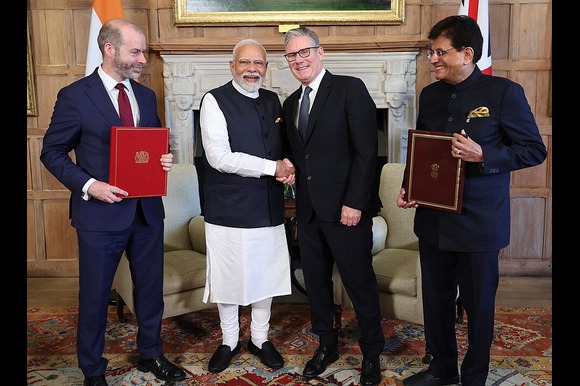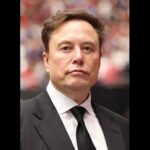British Prime Minister Sir Keir Starmer met with Indian Prime Minister Narendra Modi during his first official visit to India, marking a significant step in enhancing bilateral trade, education, and diplomatic relations between the two nations.
The meeting took place in Mumbai, India’s financial capital, where Sir Keir is leading the largest-ever UK delegation comprising over 100 business leaders, entrepreneurs, university vice-chancellors, and cultural representatives. The two-day visit has been described by Prime Minister Modi as “historic,” as both sides look to deepen cooperation across multiple sectors following the landmark UK-India trade deal signed in July.
Strengthening Trade and Economic Partnerships
During the meeting, the leaders discussed ways to expand business, investment, and trade ties between the two countries. The UK government emphasized that the yet-to-be-implemented trade deal has already generated £1 billion in investment and created nearly 7,000 jobs in Britain.
Under the agreement, India’s average tariff on UK goods will be reduced from 15% to 3%, while the UK will cut import taxes on Indian textiles, jewellery, footwear, and seafood. In return, India will reduce duties on Scotch whisky, cosmetics, medical devices, and luxury cars.
Officials predict that the deal will add £4.8 billion annually to the UK’s GDP and increase trade between the two countries by an estimated £25.5 billion per year by 2040. Last year alone, UK-India trade totalled £42.6 billion, and experts expect that figure to continue rising.
Addressing Global Security and the Ukraine Conflict
The leaders also discussed international security, particularly the ongoing war in Ukraine. While India continues to import Russian oil and gas, which contributes to Moscow’s wartime revenues, Sir Keir highlighted the importance of working towards “a just and lasting peace”.
“The prime minister and I also discussed the need for stability and security in the Indo-Pacific region, and the importance of moving away from dependence on fossil fuels,” Sir Keir said.
Although Modi maintains close ties with Russian President Vladimir Putin, he reiterated his stance that the conflict should end through “dialogue and diplomacy.”
Support for India’s UN Security Council Ambitions
In a significant diplomatic gesture, Sir Keir expressed his support for India’s long-standing ambition to secure a permanent seat on the UN Security Council, calling on the global community to recognize India as a “global player” that deserves its rightful place among the world’s decision-makers.
Human Rights and the Case of Jagtar Singh Johal
Amid the trade talks, human rights issues were also raised — particularly the case of Jagtar Singh Johal, a British citizen who has been detained in an Indian prison for seven years without conviction. His family has repeatedly urged the UK government to take “decisive steps” to secure his release.
Ahead of his meeting with Modi, Sir Keir stressed that his government continues to raise Johal’s case at every level, reaffirming the UK’s commitment to protecting the rights of British citizens abroad.
Expanding Educational Cooperation
Education featured prominently on Sir Keir’s agenda, with the announcement that more UK universities will open campuses in India, a move expected to deliver a £50 million boost to the British economy.
The University of Lancaster and the University of Surrey have received approval to launch campuses in India, joining a growing list of British institutions, including the University of York, University of Aberdeen, and Queen’s University Belfast, all expected to open within the next year.
“I’m delighted that more Indian students will be able to benefit from a world-class British education in the near future,” Sir Keir said. “This will strengthen our cultural bonds, support our economy, and create new opportunities for both nations.”
Discussions on Digital ID and Technology Collaboration
On his first day in India, Sir Keir met with Nandan Nilekani, the founder of India’s digital ID system, Aadhaar, as part of the UK’s ongoing exploration of digital identity technology. The UK government plans to roll out a compulsory digital ID system for workers to verify their right to work — a policy that has faced opposition from over 2.8 million petition signatories.
Despite public concern, Downing Street insists the initiative will reduce illegal employment and improve national security, citing India’s success with Aadhaar as an example of efficient digital governance.
Diplomatic Context and Global Trade Tensions
Sir Keir’s visit also takes place amid strained relations between India and the United States, following President Donald Trump’s decision to impose 50% tariffs on Indian imports, including an additional 25% penalty on purchases of Russian oil. Although Washington and New Delhi have been negotiating a new trade agreement, no major breakthrough has yet been achieved.
Before arriving in India, Sir Keir made clear that the UK would not relax visa rules for Indian citizens but reaffirmed his belief that there are “massive opportunities” to enhance trade, education, and cultural collaboration between the two countries.
A Milestone Visit for UK-India Relations
Sir Keir’s visit has been met with enthusiasm and optimism in India. Upon his arrival, he received a grand welcome, with the streets of Mumbai adorned with banners and photos of him alongside Modi.
As both leaders concluded their talks, the atmosphere was one of renewed partnership and shared ambition. With new trade opportunities, expanded educational links, and strengthened diplomatic engagement, the visit is being hailed as a turning point in UK-India relations — setting the foundation for deeper cooperation in the years ahead.






